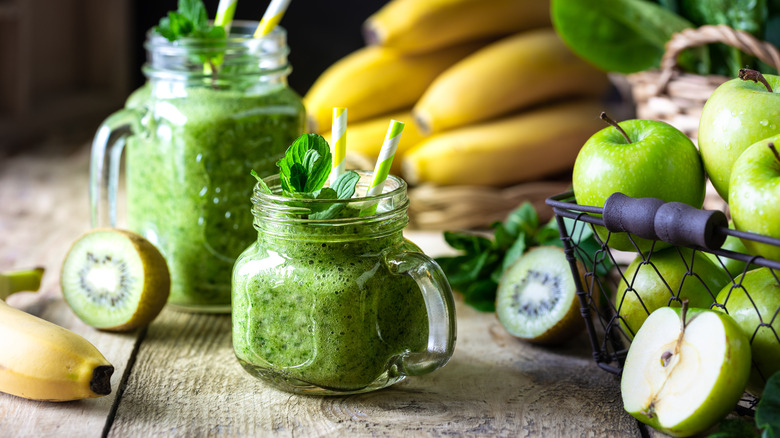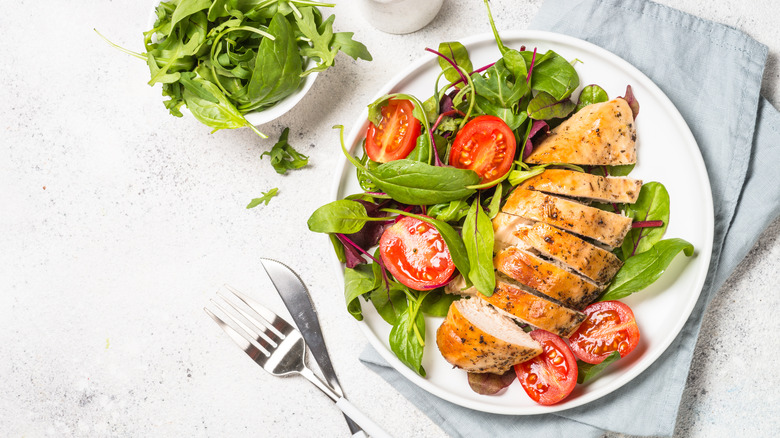What You Should Know About The Hormone Diet
The Hormone Diet has been around since 2009, when Dr. Natasha Turner published a book with the same name (via Amazon). Dr. Turner says that insulin, cortisol, estrogen, and other hormones influence body weight and overall health. Her three-step diet plan claims to detoxify and revitalize the body while restoring its strength, vigor, and balance. Think of it as a total wellness program, suggests Dr. Turner in her book.
Current evidence confirms that hormones affect your appetite, metabolism, and fat distribution. The stress hormone cortisol, for example, promotes visceral fat gain while increasing appetite and sugar cravings, explains the University of New Mexico. Visceral fat, or deep abdominal fat, may contribute to heart disease, diabetes, breast cancer, and metabolic disorders (per Harvard Health Publishing). Over time, elevated cortisol levels can lead to weight gain, obesity, and chronic ailments.
But is it possible to balance your hormones by going on a diet? The answer depends on who you ask. "I don't know of any diet that will change hormone levels in a way that these hormone changes will be instrumental in promoting weight loss," Dr. Mauvais-Jarvis told The Washington Post. Other experts, however, claim that certain nutrients and dietary patterns might influence hormone levels, notes the Institute for Functional Medicine.
The Hormone Diet aims to bring your hormones back into balance
Dr. Natasha Turner explains in her book that obesity is largely due to hormonal imbalances. For example, having too much or little of certain hormones may promote inflammation, which is a major risk factor for cancer, obesity, stroke, and heart disease. Hormonal imbalances can also affect food intake, appetite control, energy metabolism, and other factors that influence your body weight, says Dr. Turner.
Unfortunately, things are not that simple. "It's premature at this point to think anyone knows exactly what components of the diet are needed to manipulate a variety of hormones across the board in specific ways," states Dr. Suneil Koliwad (via The Washington Post). Simply put, there isn't enough evidence to support the purported benefits of a hormone diet.
Fat loss requires a calorie deficit, meaning that you must take in fewer calories than you burn (per the Mayo Clinic). The Hormone Diet says nothing about calories or portion control. You can eat healthily and still gain weight if your energy intake exceeds your calorie expenditure.
There is no such thing as a "detox"
The Hormone Diet also aims to help your body flush out toxins. But from a medical standpoint, there is no such thing as a "detox." Your body eliminates waste products through the skin, liver, kidneys, and other organs, explains the Association of UK Dieticians. While it's important to eat fruits, veggies, and other whole foods, they won't flush toxins out of your system. Some people feel better and have increased energy while on a detox diet simply because they eat healthier, notes the Mayo Clinic. These eating plans usually eliminate high-sugar and high-fat foods, which in turn may improve your energy and overall health.
As of today, there is no compelling evidence to confirm the benefits of "detox" diets, says the National Institutes of Health (NIH). As the researchers note, this approach to nutrition is unlikely to aid in weight management or help your body get rid of toxins. You may lose weight in the first few weeks, but that's because you're taking in fewer calories than usual. Chances are, you will regain the lost weight as soon as you return to normal eating, warns the NIH.
If you are struggling with an eating disorder, or know someone who is, help is available. Visit the National Eating Disorders Association website or contact NEDA's Live Helpline at 1-800-931-2237. You can also receive 24/7 Crisis Support via text (send NEDA to 741-741).
The diet promotes healthy eating habits
This six-week diet plan is largely based on whole and minimally processed foods, notes Healthline. While it's unlikely to detoxify your body or balance your hormones, it can help you build healthier eating habits. During the first phase of the Hormone Diet, you'll cut back on caffeine, alcohol, cow's milk, red meat, and gluten-containing foods. Peanuts, citrus fruits, and most oils are off-limits, too.
You can reintroduce some of these foods into your diet during the second phases, but you should still avoid non-organic meats, peanuts, dried fruits, refined grains, and high-mercury fish, such as tuna. Dr. Turner also advises against eating processed foods. The same rules apply during the third phase. When you reach this stage, you'll have to start an exercise program that includes both aerobic and strength training.
Like other detox diets, this eating plan is quite restrictive. Plus, some recommendations are subject to debate. "The best diet is [the] one that people can comply with and stick to and that has a full range of nutrients. But in many cases when people are obese, they need support from obesity experts, dietitians and medication to help them lose weight and sustain that over time," professor John Dixon told The House of Wellness. Cookie-cutter diets are unlikely to work in the long run, but you can get leaner by making lifestyle changes. If all else fails, consider reaching out to a nutritionist.




